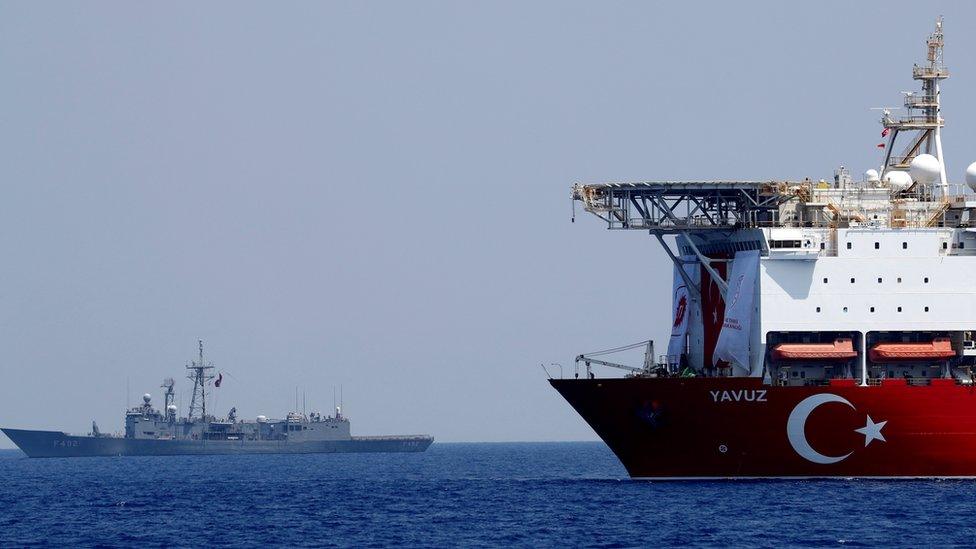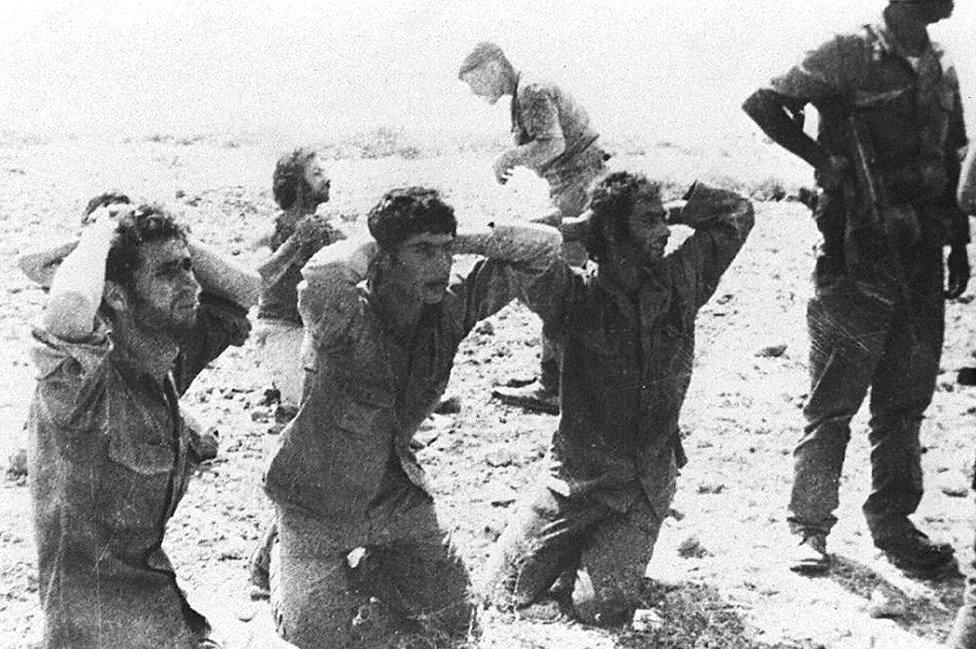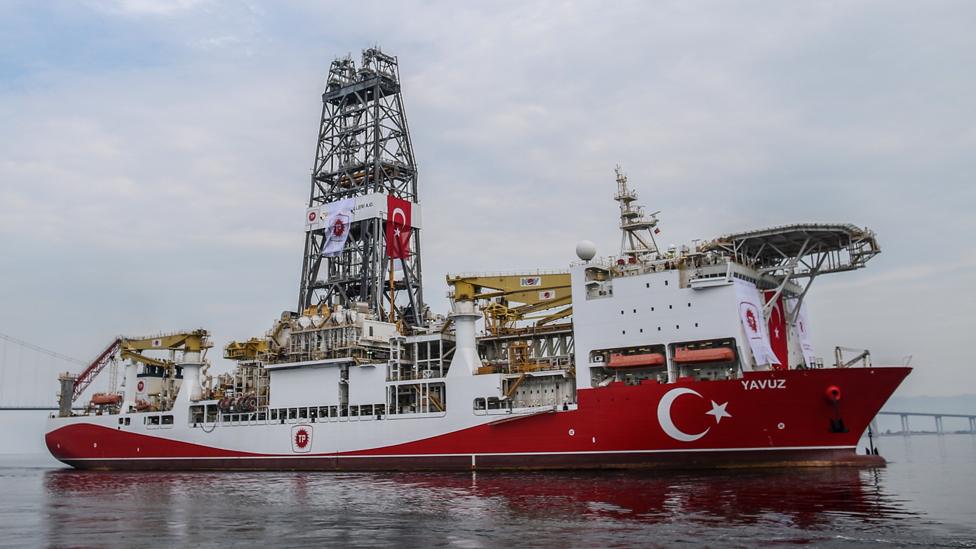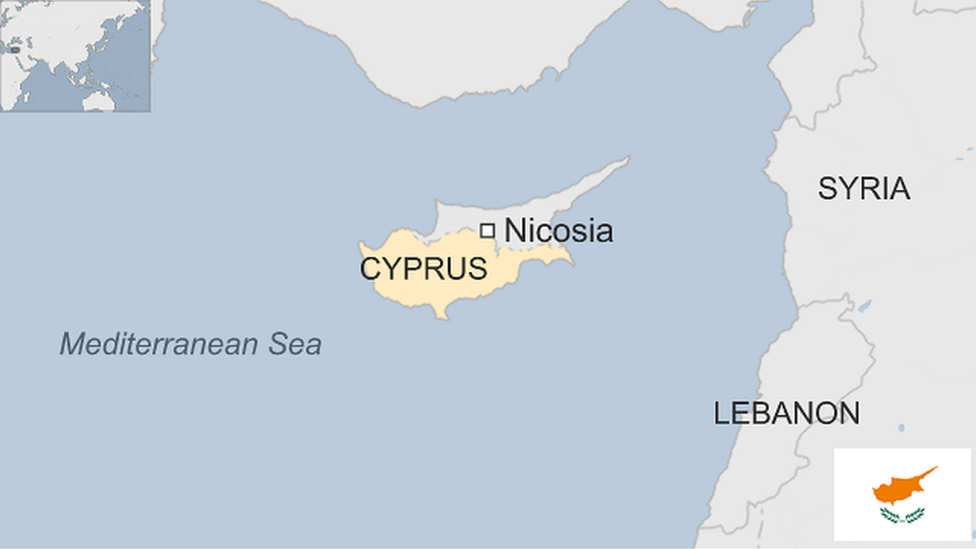Turkey ramps up drilling off Cyprus on eve of peace talks
- Published

The Turkish drilling ship Yavuz is escorted by a Turkish naval vessel to the Cyprus coast
Turkey is ramping up its drilling operations off the coast of Cyprus, sending a third ship to the eastern Mediterranean despite EU warnings.
Two Turkish vessels are already drilling for natural gas and oil off the island. The EU has said Turkey's actions are "totally unacceptable".
The Republic of Cyprus is in the EU, but the breakaway north is pro-Turkey.
Ankara's latest move comes on the eve of talks between the president of Cyprus and the Turkish Cypriot leader.
On Friday, Cyprus President Nicos Anastasiades is expected to discuss with Mustafa Akinci ways of resuming negotiations aimed at reuniting the divided island after talks failed two years ago.
Turkey has said its drilling operations, which are raising tensions in the region, are taking place inside its continental shelf, and therefore comply with international law.
The two drilling ships, the Fatih and the Yavuz, will be joined in the coming days by a further exploration vessel, which is expected to begin its operations by the end of August.

But the EU has threatened to impose sanctions on Turkey if it continues what EU Commission President Jean-Claude Juncker described as "illegal drilling".
In June, the European Council - the EU government leaders - called on Turkey, external to "show restraint, respect the sovereign rights of Cyprus and refrain from any such actions".
Turkey is a candidate for EU membership but its negotiations are currently frozen. The EU Commission has said President Recep Tayyip Erdogan's government has backtracked on pledges to improve justice and the rule of law.
Why have tensions worsened?
The Greek- and Turkish-Cypriot communities have been split since conflict erupted in 1974.
Tens of thousands of Cypriots fled their homes when Turkey invaded the north of the island in response to a military coup in Cyprus backed by Greece.
A UN buffer zone, known as the Green Line, now separates the two communities on the island in the Mediterranean.
Cyprus is badly in need of income and energy and there have been long-running disagreements between the two sides over drilling for oil and gas.
For more than 40 years Cyprus has been a divided island
Things came to a head in June when the EU threatened sanctions against Turkey if it continued "illegal" exploration in waters near Cyprus.
The Republic of Cyprus is in the EU, but the self-declared Turkish Republic of Northern Cyprus in the north is recognised only by Turkey, and is internationally isolated.
Turkey had threatened to start drilling back in 2011 after Cyprus licensed Texas-based Noble Energy to carry out exploratory work for gas off its southern coast.
What are the other sticking points?
Property
What should happen to properties that Greek Cypriots had to abandon in 1974?
Should they get the right to take their old homes back, or be compensated - and if so by how much?
Security
How can the security of Turkish Cypriots be guaranteed if Turkish troops withdraw?
Greek Cypriots see them as an occupying force, so should some stay or should Turkey retain the right to intervene?
Who would act as a guarantor of the deal? The EU, of which Cyprus is already a member, or the UK, which has two military bases on the island?
Power and the role of the EU
There is talk of a rotating presidency, but how would that work?
Could a Turkish Cypriot president really represent the country from time-to-time at EU summits?
Territory
How much more territory should Greek Cypriots gain to reflect the fact that they make up the majority of the island's population?
UN peacekeeping forces estimate that 165,000 Greek Cypriots fled or were expelled from the north, and 45,000 Turkish Cypriots from the south, although the parties to the conflict say the figures are higher.

Conflict timeline

Cyprus 1974: Greek Cypriot soldiers surrender to invading Turkish forces
1955 - Greek Cypriots seeking unification with Greece begin guerrilla war against British rule
1960 - Independence from British rule leads to power-sharing between Greek Cypriot majority and Turkish Cypriot minority
1963-1964 - Inter-communal violence
1974 - Cypriot President Archbishop Makarios deposed in a coup backed by Greece's military junta. Turkey sends troops to the island, who then occupy a third of it in the north
1983 - Rauf Denktash declares breakaway Turkish Republic of Northern Cyprus, recognised only by Turkey
2004 - Cyprus, still divided, joins the EU, after a UN peace plan was backed by Turkish Cypriots - but rejected by Greek Cypriots

- Published21 June 2019

- Published7 April 2023
